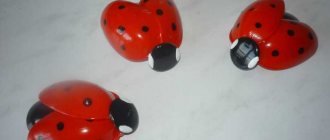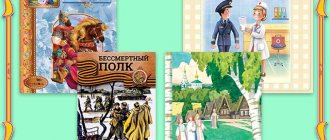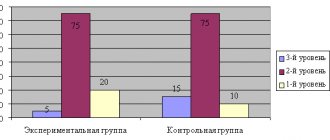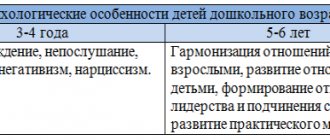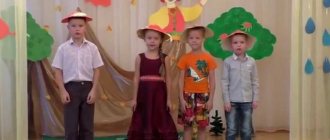Master class on the topic: “It all starts from childhood...” on moral and patriotic education
1 slide. Master class on the topic: “It all starts from childhood...” 2nd slide. Goal: to clarify and consolidate the knowledge of teachers on the moral and patriotic education of preschool children. Objectives: - increase pedagogical competence in matters of moral and patriotic education; - generalize the knowledge of teachers about the goals, objectives and means by which the moral and patriotic education of preschool children is determined; - develop a way of analyzing your own activity and the activity of another participant during the game, showing pedagogical tact; - promote the acquisition of teamwork experience. 3 slide. For children: The goal of patriotic education in preschool educational institutions is to educate a humane spiritual and moral personality, worthy future citizens of Russia, patriots of their Fatherland. The objectives of the moral and patriotic education of preschoolers are: instilling in the child love and affection for his family, home, kindergarten, street, village, developing a caring attitude towards nature and all living things, instilling respect for work, developing interest in Russian traditions and crafts, forming basic knowledge about human rights, expanding ideas about Russian cities, introducing children to the symbols of the state (coat of arms, flag, anthem), developing a sense of responsibility and pride in the country’s achievements, developing tolerance, a sense of respect for representatives of other nationalities, peers, parents, neighbors, and other people. formation of self-esteem as a representative of one’s people. 4 slide. Relevance. In recent decades, many complex, contradictory events have occurred in our country regarding public life, politics, and the system of state and local government. Some holidays have become history, new ones have appeared; information about the army and the events taking place in it has become more open; facts related to national confrontation are increasingly being noted among young people; The media intensively promote the Western way of life, which is alien to us. In this regard, the younger generation is experiencing a decline in interest and respect for Russia’s past. Therefore, at the present stage, the problem of moral and patriotic education of children is so relevant. Preschool childhood is the most important period in the development of a person’s personality, when the foundations of civic qualities are laid and children’s first ideas about the world around them, society and culture are formed. In preschool age, feelings dominate all aspects of a child’s life. 5 slide. Smart thoughts. V. A. Sukhomlinsky paid great attention to nurturing the child’s feelings. He believed that it was important to educate a child’s feelings from an early age, to teach him to balance his own desires with the interests of others. Anyone who, in the name of his desires, throws aside the laws of conscience and justice will never become a real person and citizen. Before a person can empathize with troubles and problems, he must generally gain experience of experiencing human feeling. The baby discovers his homeland for the first time in the family. This is his closest environment, where he draws such abstract concepts for him as “work”, “duty”, “honor”, “Motherland”. The sense of duty towards parents is deeply social; it develops bit by bit and, as the child grows up, develops into a higher feeling – a sense of duty towards society and the Motherland. From all of the above, it follows that the basis of patriotic education is the moral, aesthetic, labor, mental education of a little person, and gaming activities will help us realize our goals and objectives for moral and patriotic education. Every time gives birth to its heroes. We, teachers, must help these heroes of our time emerge and educate true patriots of Russia. 6 slide. I would like to start our conversation with an old parable. Parable “The Sprouted Seed” One day the disciples came to the elder and asked him: “Why do bad inclinations easily take hold of a person, but good inclinations take hold of a person with difficulty and remain fragile in him?” - What happens if a healthy seed is left in the sun and a sick one is buried in the ground? - asked the old man. “A good seed that is left without soil will die, but a bad seed will germinate and produce a sick sprout and bad fruit,” answered the students. “This is what people do: instead of secretly doing good deeds and cultivating good beginnings deep in their souls, they put them on display and thereby ruin them. And people hide their shortcomings and sins deep in their souls so that others do not see them. There they grow and destroy a person in his very heart. Be wise. The disciples thanked the elder for his teaching and went away in thought. Therefore, we teachers need to show and tell children where we should store bad seed so that no one gets hurt in the end. Slide 7 Exercise. Pedagogical situations. Comment on situations and find a way out. In February, kindergartens traditionally hold classes dedicated to Defender of the Fatherland Day. At one of the classes in the senior group, the teacher asks the boys who they would like to serve in the army. The guys name various military professions: pilot, sailor, tanker, border guard, submariner, artilleryman. Misha does not take part in the conversation. The teacher encourages him to speak out too: “Misha, who would you like to be? " Misha: “I won’t go into the army. Dad said there was nothing to do there! " 2. The teacher invites the pupils of the preparatory group to take part in organizing the exposition of the mini-museum. The theme of the exhibition is “Our grandfathers – glorious victories.” For a whole month, the guys brought letters and photographs from the war years, photo albums, and military uniforms from home. They enthusiastically laid out these items on the shelves, several times a day they approached the location of the exhibition exhibits, looked at them, and discussed them. One day, the teacher heard a phrase dropped by one of the children: “And Irina Andreevna (this is the nanny of the group in which the exhibition was organized) said that we brought all sorts of things and now it became inconvenient for her to wipe the dust on the shelves! » 8 slide. In this regard, the urgency of solving the most pressing problems of instilling patriotism in working with preschool children is obvious. Patriotism is a complex and lofty human feeling; it is so multifaceted in its content. Which is indefinable in a few words. Feeling of Motherland. It begins in a child with his relationship to his family, to the closest people - mother, father, grandmother, grandfather. When you talk to children about family, you learn proverbs and sayings. “Find out and name the proverb from the picture” - display of pictures. Let us remember them now: slide 9. 1. “There is no sweeter friend than your own mother” 10 slide. 2. “The whole family is together, and the soul is in the same place” 11 slide. 3. “When there is harmony in the family, there is no need for treasure” 12 slide. 4. “A family is strong when there is only one roof over it.” Contact with folk art and traditions, participation in folk festivals enriches people spiritually, instills pride in their people, and maintains interest in their history and culture. Therefore, it is necessary to know and study the culture of your ancestors. Slide 13 about craft. Teacher: In the old days, children from the age of three were introduced to crafts. The boy's father put him on a horse, and the future man began training in military affairs, hunting, and crafts. At the same age, girls began to be taught needlework and housekeeping. The work for the children was feasible, but real. The father carries a bag, the son carries a bag; Mom has a spindle, daughter has a spindle. Well, we have no reason to sit idle! Task 2. Needlewoman. Creativity has always occupied an important place in human life. All their lives, people have strived to equip their lives with comfortable, durable things, but they made them in such a way that they please the eye and cheer the soul. Task 1 – making home slippers from fabric and lining; Task 2 – making cookies from cookies, butter, nuts, cocoa, sugar; Task 3 – making potholders from fabric and decorating with decorative elements. Working with the audience. "Brain attack". Solving the rebus. 10566406858000 14 slide. 75879614323200 Coat of arms 15 slide. 75870427114500 Anthem 16 slide. 82931029019500 Russia 17 slide. Honor 758825- 44323000 18 slide. 85090025019000 Rodina 19 slide. 85105013722400 Moscow 20 slide. 7588113492500 War 21 slides. 78955412066400 Victory 22 slide. 7848602667000 Order 23 slide. Memory Slide. "Black box". Attention! Question! The black box contains a symbol of Russian life, which has long served as a sign of social inequality and a measure of wealth in the family. In the villages it was passed down from generation to generation. With the development of industry, everyone could order it from a catalog or their own sketch. At fairs they were sold by weight and grade. So this is... . (Samovar). Here lies an object that is a symbol of disputes, bitterness, sadness, evil, because of which wars began. But this did not stop people, did not push them away from this subject, but, on the contrary, seduced them. This item is found not only in fairy tales, but also in mythology and Christian legend. So this is...(Apple) Crafts Summing Up. slide. Clip of a song about the Motherland (beautiful). Reflection “Everything is in our hands” Based on the master class, I suggest you choose and write on the sides of the cube what you consider the most important in the education of moral and patriotic feelings in preschoolers. Take them in your hands. We see that the cube does not hold on itself, but only thanks to our hands. “Proper upbringing is our happy old age, bad upbringing is our future grief, these are our tears, this is our guilt before other people, before the whole country. » A. S. Makarenko Education of moral and patriotic feelings in children is in your hands! ! ! References: Vetokhina A. Ya. “Moral and patriotic education of preschool children.” St. Petersburg: “Childhood Press”, 2012. Makhaneva M. D. “Moral and patriotic education of preschool children.” — M: “Sphere”, 2010. Zelenova N. G., Osipova L. E. “We live in Russia.” — Moscow, 2009 Kozlova S. A. “My world.” — M: “Sphere”, 2010. Komarova T. S. “Folk art in raising children.” – M: , 2010 Mosalova "Me and the World". – M.: “Childhood”, 2013. Novitskaya M. Yu. “Heritage. Patriotic education in kindergarten." – M: “Link a-Press”, 209. Shorygina T. A. Native fairy tales “Moral and Patriotic Education.” — M: “Prometheus; Book lover", 2010
Master class “Games for instilling patriotic feelings in preschoolers”
Purpose: To demonstrate clearly, using the example of practical activities, the possibility of educating moral and patriotic qualities in preschoolers through the method of play.
TASKS:
Increasing knowledge on the spiritual and moral education of children.
Development of a favorable emotional mood with the participation of a team of teachers.
Improving educational methods for spiritual and moral education using practical techniques.
The content of the Federal State Educational Standard notes the urgent need to intensify the process of instilling patriotism in preschoolers. Children at this age are very inquisitive, responsive, and receptive. They easily respond to all initiatives and are able to sincerely sympathize and empathize. For the educator, this is a time of fertile soil. Indeed, at this age great opportunities arise for the systematic and consistent moral education of children. The formation of the child’s spiritual foundation, emotions, feelings, thinking, processes of social adaptation in society takes place, and the process of realizing oneself in the world around us begins.
Patriotic education of a child is the basis for the formation of a future citizen. The main tasks of patriotic education of preschool children are the formation of love for their native land (involvement in their home, family, kindergarten, city); — formation of spiritual and moral relations; — formation of love for the cultural heritage of one’s people; - nurturing a love of respect for one’s national characteristics; — self-esteem as a representative of one’s people; - a tolerant attitude towards representatives of other nationalities, peers, parents, neighbors, and other people.
The system of work on patriotic education of children includes three areas. Ecological Historical and local history Cultural
— Nature is an important factor in the education of patriotism. She surrounds the child, enters his life early, is accessible and understandable to him. The formation of a sense of the Motherland begins with the ability to see the beauty of one’s native nature. Knowledge of the nature of one’s region makes it possible to see and find connections between natural phenomena, teaches correct behavior, the ability to care for, preserve and love what surrounds us.
Ecological direction.
1. Didactic game “Exclude unnecessary things from the list...”.
The assignments are on pieces of paper. Name the extra birds that are not found here: thrush, tit, bullfinch, rook, swallow, nightingale, toucan, woodpecker, owl, cuckoo, partridge, wood grouse.
Eliminate unnecessary medicinal plants that do not grow here: rose hips, mint, wormwood, eleutherococcus, calendula, lemongrass, motherwort (Schisandra - Northern China, Far East. Eleutherococcus - Far East, northeast China, north Korea.)
2. Game exercise “Walk in the forest”
Goal: education of patriotic qualities of the individual; formation of love for native places, caring attitude towards nature.
“Guys, I suggest you now take a walk in an imaginary forest. Let's remember how to behave in the forest. Of course, be quiet, don’t make noise so as not to scare the animals; do not litter, you must treat nature with care and respect, and also do not break branches or step on berries; don't run away, because you might get lost. And here the path began to have small puddles; it had recently rained. So we step over the puddles. Everyone follows each other, we don’t lag behind. Well, here we are in the forest. It's so fresh and beautiful here. Yes guys? What fresh air, let's breathe. Look around, there are many different trees. These are white birch trees, poplar, maple, pine, spruce, and here is a mighty oak. And look, someone’s ears are sticking out in front. Yes, this is a gray bunny. Let's be quiet so as not to scare him away
Historical and local history direction.
Quiz games 1. The land where you were born? (Motherland). 2. A large territory that has definite boundaries and enjoys state sovereignty? (A country). 3. What is the name of our country? (Our country is called Russia). 4. The ancient name of Russia? (Rus). 5. In what parts of the world is Russia located? (Russia is located in parts of Europe and Asia) 6. What holiday is celebrated in Russia on June 12 (Russia's Birthday is celebrated on June 12) 7. A special political institution that ensures social security of the population, defense and security of the country? (State). 8. A person who belongs to the permanent population of a given state and enjoys all the rights and fulfills all the duties of that state? (Citizen). 9. What are the citizens of Russia called? (Citizens of Russia are called Russians). 10. Official emblem of the state? (Coat of arms). 11. What does the double-headed eagle symbolize on the coat of arms of Russia? - unity; - loyalty; - strength; - power. 12. Symbol of the state, its sovereignty: a cloth of established sizes and colors attached to a tree or cord? (Flag). Cultural direction - Where does the Motherland begin... with fairy tales, legends, epics, nursery rhymes, proverbs, sayings... From infancy, a child hears his native speech. Works of oral folk art not only form a love for the traditions of their people, but also contribute to the development of personality in the spirit of patriotism. Game: “Restore the proverbs” 1. There is no more beautiful thing in the world……. when there is only one roof over it. 2. That bird is stupid, ……. and your village is all on your mind. 3. If the friendship is great, ……. than from his native land 4. The family is strong, ……. good children grow up. 5. A man without a homeland……. be also a son of your people. 6. In a good family……. like a nightingale without a song. 7. Be not only your father’s son……. Our homeland. 8. The Kozak would rather die, ……. to whom her nest is not nice. 9. You live on the side, ……. The Motherland will be strong. Game: “Continue the proverb” 1. For your Motherland, you have neither strength nor life ... (sorry) 2. The Motherland is the mother of the people who can stand for it ... (stand up) 3. Foreign viburnum, Motherland - ... (raspberry) 4. The Russian soldier does not know ... ..(obstacles) 5. The hero who stands for the Motherland ... (mountain) 6. Take care of your native land like a mother ... (beloved) 7. A Cossack fights in a foreign land, and his wife ..... (grieves in the house) 8. A Cossack without a horse, what a hunter .... (without a gun) 9. The homeland is a mother, and a foreign land is ..... (stepmother) Game: “Say the proverb differently” - Translate a foreign proverb, saying into Russian, find an analogue: “When a lady leaves car, the car goes faster” (English) – “A woman with a cart makes it easier for a mare.” “The head is the crown of the body, and the eyes are the best diamonds in that crown” (Azerbaijani) - “The eyes are the mirror of the soul.” “He who asks will not get lost” (Finnish) - “Language will lead you to Kyiv.” “You can’t cook rice with talk” (Chinese) – “They don’t feed the nightingale with fables.” With the help of games, we form in children the correct attitude to the phenomena of social life, nature, objects of the surrounding world, systematize and deepen knowledge about the Motherland, about people of different professions and nationalities, and an idea of work activity.
Reflection:
- Hold hands, smile at each other.
— What do you expect from today's master class? I hope that your expectations will be fulfilled, but we’ll see how much.
